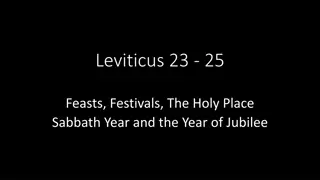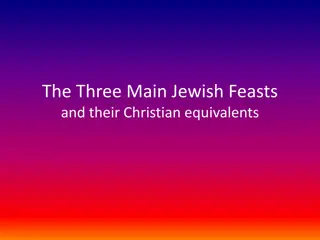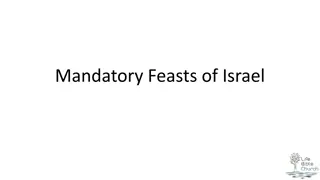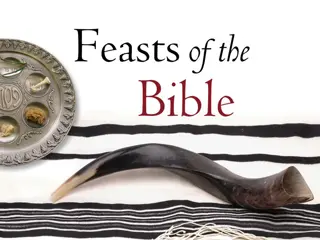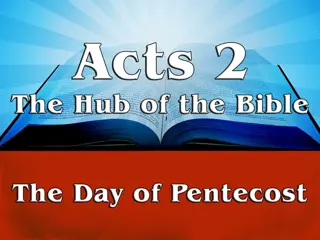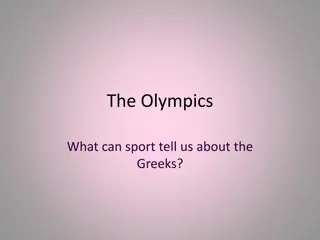Various Types of Celebrations and Essential Needs for a Successful Event
Explore different types of celebrations such as birthday parties, engagement parties, Ramadan feasts, and more. Discover the essential items required for celebrations like balloons, decorations, food, and music. Access related games and activities through provided links for an interactive learning e
3 views • 43 slides
Understanding the Feasts and Festivals in Leviticus
Explore the significance of the feasts, festivals, and rituals outlined in Leviticus, such as Passover, the Feast of Unleavened Bread, and the Day of Atonement. Discover how these observances served to set the Israelites apart and foster spiritual growth and connection with God.
1 views • 14 slides
Jordanian Traditions: Mansaf and Coffee Culture
Explore the rich Jordanian traditions of Mansaf, a delicious dish made with lamb and yogurt, and the cultural significance of Jordanian coffee, known as Al-Qahwa, in social gatherings and events like weddings and feasts.
0 views • 6 slides
Comparison of Jewish Feasts and Christian Equivalents
Explore the three main Jewish feasts - Pesach (Passover), Shavuot (Pentecost), and Sukkot - and their Christian counterparts. Discover the significant events, traditions, and symbolic meanings associated with each celebration, emphasizing the connections between the Old Testament feasts and their Ch
0 views • 11 slides
The Significant Feasts of Israel
The Feasts of Israel are mandatory observances that hold great spiritual significance for the Jewish people. These feasts include the Sabbath, Feast of Trumpets, Passover and Unleavened Bread, Pentecost, Day of Atonement, Booths, and more. Each feast is celebrated at a specific time of the year and
0 views • 6 slides
God's Calendar of Redemption: Insights from the Feasts in Leviticus 23
Discover the significance of the seven holidays appointed by God in Leviticus 23 for the Israelites, reflecting themes of protection, provision, promise, and redemption. Explore how these feasts foreshadow Jesus' sacrifice, resurrection, and the work of the Holy Spirit, culminating in the fulfillmen
0 views • 6 slides
The Significance of Pentecost in Jewish and Christian Traditions
The three annual feasts of the Jews - Passover, Pentecost, and Feast of Tabernacles - held deep religious significance, with Pentecost being the 50th day after Passover. This day was pivotal in history, marking important events for both Jews and Christians. Pentecost was a time of harvest, giving of
0 views • 7 slides
Understanding the Cultural Dimensions of Food and Religious Influences in Culinary Arts
Explore the impact of religious beliefs on food traditions and dietary restrictions across different cultures in the culinary world. Learn about the influence of major world religions on eating habits, food choices, and culinary practices. Discover how various religious groups, such as Christians, o
0 views • 26 slides
Mapping Time and Culture: Mughal Feasts in Early Modern Era
Visual mapping of Mughal feasts in the early modern era provides insight into the historical and cultural connections between Eastern and Western memoirs. By analyzing the role of feasts in a connected history, this project applies a quantitative and visual approach through digital humanities to und
0 views • 11 slides
Ancient Greek Olympics: Insights into Sports and Culture
The ancient Greek Olympics provide a window into the sporting culture of the Greeks. Dating back to the 9th century BC, the games evolved over time to include various events like footraces, wrestling, boxing, and chariot racing. Competitors were free-born Greek men, with prizes including olive leaf
0 views • 9 slides
The Queen's Decision in the Book of Esther
A narrative from the book of Esther about Queen Vashti's decision during King Ahasuerus' reign, depicting lavish feasts, colorful decorations, and the royal court's lifestyle. The story sets the stage for subsequent events in the Persian Empire, showcasing opulence and cultural practices of that era
0 views • 11 slides

